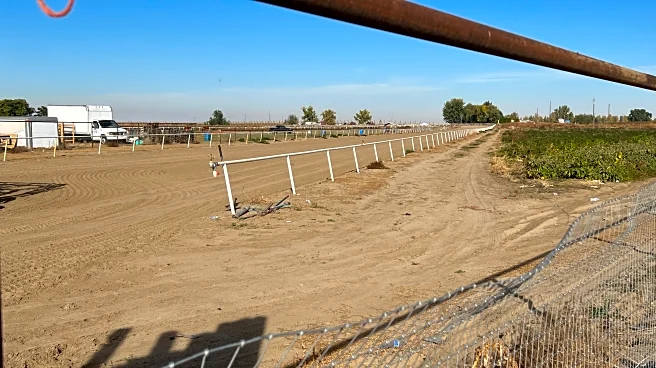What's Happening?
A senior Hamas delegation, led by Khalil al-Hayya, has arrived in Cairo to engage in discussions with Egyptian intelligence officials regarding the next phase of the Gaza ceasefire agreement. The talks
are expected to focus on governance, security, and the preservation of Hamas' weapons under international oversight. Despite the progress in negotiations, Hamas is reportedly seeking ways to avoid handing over or destroying its arsenal, with sources indicating that senior officials have approached the Palestinian Authority to secure an arrangement for storing the arms. The discussions also aim to address the mandate of a committee slated to manage the next stage of the agreement.
Why It's Important?
The outcome of these negotiations could significantly impact the stability and security dynamics in the Gaza Strip. If Hamas successfully retains its weapons under international supervision, it may alter the balance of power in the region and affect future peacekeeping efforts. The involvement of Egyptian intelligence officials highlights the importance of regional cooperation in achieving a sustainable ceasefire. Additionally, the talks could influence the humanitarian situation in Gaza, as the preservation of weapons might affect the delivery of aid and the demilitarization process. The international community is closely monitoring these developments, as they have broader implications for Middle Eastern geopolitics.
What's Next?
The next steps in the ceasefire agreement will likely involve detailed discussions on the governance and security arrangements in Gaza. The committee tasked with managing the next stage of the agreement will play a crucial role in overseeing the demilitarization process and ensuring compliance with international standards. Stakeholders, including the Palestinian Authority and regional powers, may react to the preservation of Hamas' weapons, potentially influencing the pace and success of the negotiations. The international community may also increase diplomatic efforts to support a peaceful resolution and address humanitarian needs in the region.
Beyond the Headlines
The preservation of Hamas' weapons under international oversight raises ethical and legal questions about the role of armed groups in peace processes. It challenges traditional disarmament approaches and may set a precedent for future negotiations involving non-state actors. The situation also underscores the complexity of achieving lasting peace in conflict zones, where security concerns must be balanced with humanitarian needs. Long-term shifts in regional alliances and power dynamics could emerge from these negotiations, affecting the broader geopolitical landscape in the Middle East.










